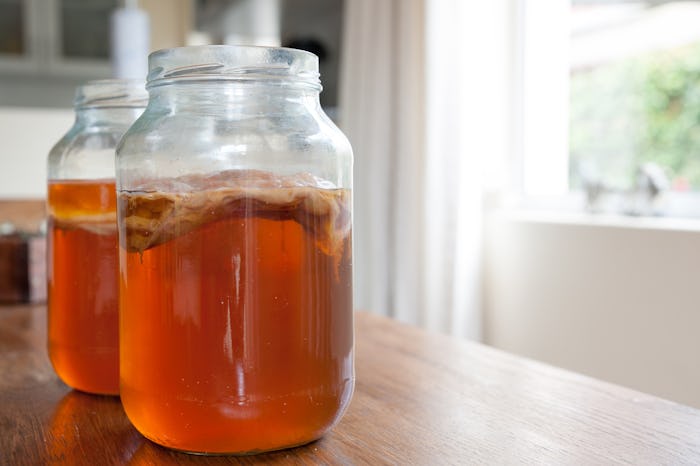Life

Are Fermented Foods Safe To Eat During Pregnancy? Experts Weigh In
So you’re pregnant. That means following a positive pregnancy test and exciting announcement are all of the questions, am I right? Between safe sleeping positions, whether or not you can have coffee (you can, thank goodness), and how much you can exercise, the list is long. And food, unfortunately, is no exception. You probably already know that your favorite Brie comes with limitations and certain types of fish are out the window, but what about other popular health trends, like sauerkraut and kefir? Are fermented foods safe to eat during pregnancy? Experts say it’s about choosing the right ones.
“Generally, yes, fermented foods are safe to consume during pregnancy,” Natalie Allen, a registered and licensed dietitian and clinical faculty member in the Biomedical Sciences Department at Missouri State University, tells Romper in an email interview. “However, women still need to use caution when choosing fermented foods.”
For example, Allen says sauerkraut and yogurt are fermented foods that can benefit a mother and baby during pregnancy, but unpasteurized milk, which may be fermented, is not a good option because it could contain harmful bacteria.
“Fermented foods can help improve mom and baby's immune system and overall gut health,” Allen says, adding that research is showing pre and probiotics could play an important role in prevention and management of gastrointestinal diseases and overall health. “[Other] fermented foods that would be beneficial during pregnancy include kefir, miso soup, and tempeh.”
Dr. Will Bulsiewicz, a board-certified gastroenterologist and creator of @HappyGutMD, says you should always “talk with your doctor before trying new food or drink during pregnancy, but in most cases, fermented foods can absolutely be a part of a healthy, safe pregnancy diet."
"In fact, studies have shown that the health of mom's gut during pregnancy influences the development of baby's brain and immune system,” he tells Romper in an email. “This explains why probiotics during pregnancy can lower the risk of the child developing eczema later in life.”
Bulsiewicz says one benefit of eating fermented foods during pregnancy is that they unlock higher levels of nutrients from the foods you eat, “allowing you and your baby to receive the full nutritional benefit of the foods you are eating.” Fermentation also helps with digestion, which is a benefit if you suffer from constipation during pregnancy, a common complaint due to increased levels of progesterone, he adds. “There are also studies showing the benefit of healthy bacteria for preventing preeclampsia, gestational diabetes and intrauterine growth retardation during pregnancy."
So, all in all, it sounds like most fermented foods are a win during pregnancy. Pair it with a side of coffee, and you're all set.